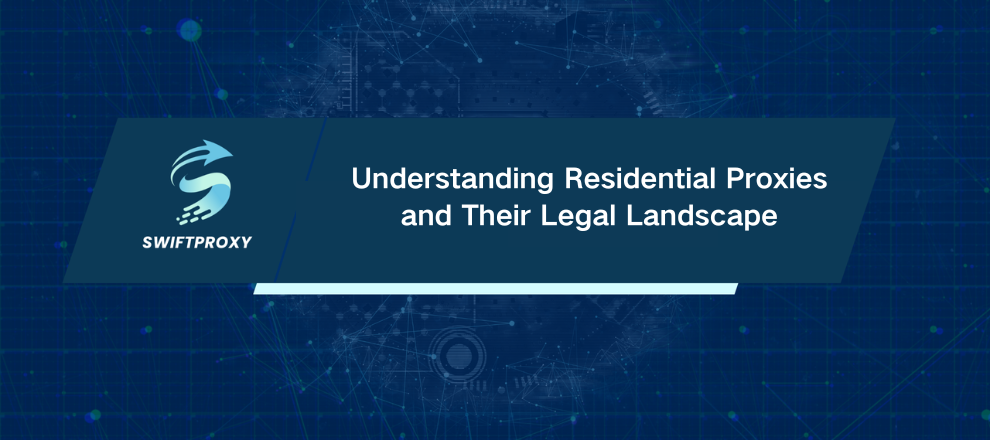Understanding Residential Proxies and Their Legal Landscape

The internet is becoming more restrictive by the day. Websites track users, block access, and block automated tools. Whether you're scraping data, managing multiple accounts, or just protecting your privacy, residential proxies have become a game-changer.
The big question that often comes up is whether residential proxies are legal. While proxies themselves aren't illegal by default, what really matters is how they are used. Let's break down everything you need to know about residential proxies, their legal standing, and when they can get you into trouble.
Introduction to Residential Proxies
Residential proxies are IP addresses that real Internet Service Providers (ISPs) assign to actual users. Unlike data center proxies, which are created in bulk by hosting providers, residential proxies come from real devices—think home Wi-Fi or mobile connections.
Key Features:
Real ISP-Assigned IPs: These are harder to detect or block.
Better Reputation: Websites tend to trust residential IPs more than datacenter proxies.
More Anonymity: You can browse or scrape without being flagged.
How Do Residential Proxies Operate
In simple terms, when you connect to a website using a residential proxy, your traffic goes through a real device. That device is a real user who's agreed to share their internet connection. As a result, the website sees the real residential IP—not yours. You stay anonymous, bypassing detection.
Types of Residential Proxies:
Rotating Proxies: Change IPs every few minutes (or per request).
Static Proxies: Maintain the same IP for a longer session.
For web scraping, rotating proxies are recommended as they help prevent IP bans. For logging into multiple accounts, static proxies can be more effective at avoiding suspicious login patterns.
Is Using Residential Proxies Legal
Short answer? Yes—if used ethically. It's all about how you deploy them.
Legal Proxy Usage
Online Privacy and Security: Hide your real IP to protect yourself against hackers and tracking.
Web Scraping and Market Research: Gather public data from competitors, monitor prices, track SEO rankings, or follow consumer trends.
Ad Verification: Brands use proxies to verify their ads appear correctly in different regions.
Managing Multiple Accounts: Run several accounts without getting flagged.
Illegal Proxy Usage
Bypassing Geo-blocks: Using proxies to access restricted content without proper licensing.
Scraping Private Data: Gathering data without consent, especially copyrighted content.
Fraud or Scams: Using proxies for activities like identity theft or creating fake accounts.
It's just like a kitchen knife—perfectly legal, but if used for a crime, you're in trouble.
Before using proxies, it is important to check the terms of service. If a website bans proxies, the risks should be carefully weighed before proceeding.
Legal Use Cases for Proxies
When used responsibly, proxies can be beneficial for many industries.
Online Privacy and Security
Hide your real IP and encrypt your traffic—especially useful when using public Wi-Fi.
Web Scraping and Market Research
Proxy services help companies gather public competitor data, track SEO rankings, or even monitor consumer trends without getting blocked.
Example: Airlines might hike prices based on your search history. A residential proxy keeps your searches anonymous, preventing this.
Social Media and Ad Verification
Proxies help verify if ads are showing up properly in various locations.
Illegal Uses of Proxies
Unfortunately, not all proxy users play by the rules. Here are some examples of illegal usage:
Hacking and Fraud
Proxies are often used in phishing schemes, identity theft, or for creating fake accounts for financial fraud.
Bypassing Geo-Restrictions
Streaming region-locked content (like Netflix) without proper licenses can result in account suspension.
Unauthorized Scraping
Scraping personal data or copyrighted content without permission is a major legal no-no.
Countries Where Proxies Are Restricted or Banned
While proxies are generally legal in most countries, some impose strict regulations.
Countries That Ban or Restrict Proxies:
Russia: Only government-approved proxies are allowed.
Iran and UAE: Unauthorized proxies can lead to hefty fines.
North Korea: Only government-approved access to the internet is allowed.
If you're in one of these regions, always tread carefully.
How Residential Proxies Are Obtained
This is where things get tricky. Not all residential proxies are created equal.
Ethical Providers: Users opt-in to share their IPs (often rewarded for doing so).
Unethical Providers: Some networks hijack devices with malware or use botnets to steal IPs.
Stick with trusted providers. If a deal seems too good to be true, it probably is.
Conclusion
Residential proxies offer great benefits for privacy and online tasks when used responsibly. It's important to understand the legal boundaries and always follow website rules. Choosing reputable providers ensures safer, more reliable access. Use residential proxies wisely to protect your data and browse the web securely.

















































